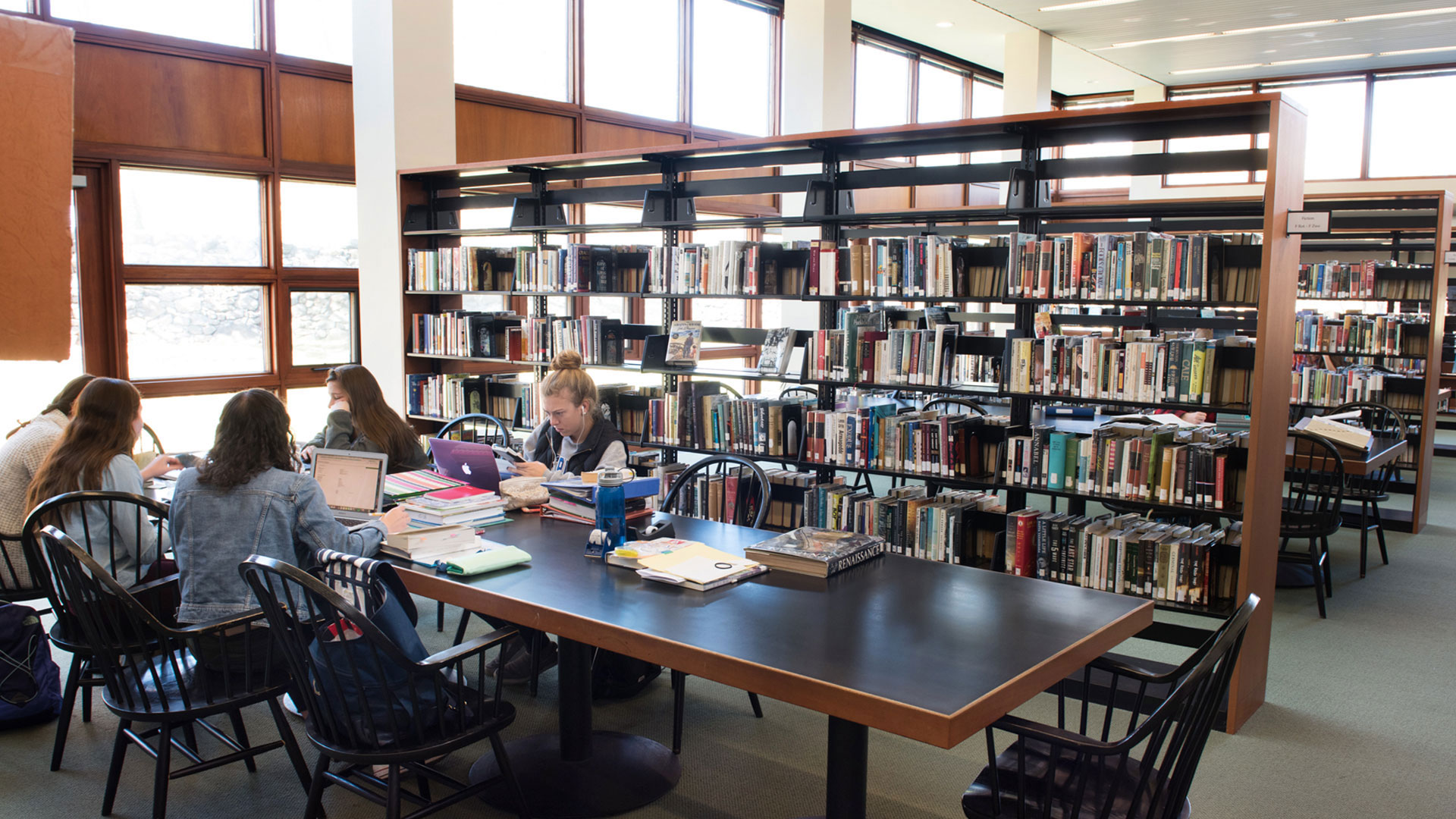

While Westover students are familiar with the challenges of writing assignments, Kathryn Albee gave the nine students in her advanced Latin course this semester a project with a twist:
To write a short story in Latin.
This was the first time Kathryn had ever asked her students to put their Latin skills through this kind of test. The fall semester portion of the course, Latin Prose Composition, gave Kathryn’s students the opportunity to put the Latin vocabulary and grammar rules they’d learned in their first two years to work.
“There is a big trend among Latin teachers right now of having their students not only read authentic classical texts, but also to read modern authors who are writing short novels in Latin,” Kathryn explained. “There is one author I really like, Lance Piantaggini. We have read a couple of his books together.”
“He uses a technique called ‘sheltered vocabulary,’” Kathryn said. The stories’ limited number of words enhances their value as teaching tools. His succeeding novellas increase in length and grammatical difficulty, which can help Latin students advance their skills and comprehension.
Piantaggini’s illustrated novellas inspired Kathryn to challenge her students to create their own short stories in Latin.
For much of the semester, Kathryn’s students worked on story ideas and initial drafts of their stories. Each story had to be at least 40 sentences in length. The sentences also had to incorporate examples of a range of grammatical elements, such as the use of passive voice and independent subjunctives. As part of the project, the students also had to assemble a vocabulary list of words they had used in their stories.
Like Piantaggini’s novellas, Kathryn said, the students’ final stories also had to include illustrations, though they could range from simple stick figures to more detailed images.
As with Piantaggini’s stories, Kathryn encouraged her students to choose a theme for their vocabulary words on which to build their stories. One of his stories, for example, introduces the reader to the names of a number of animals; another takes the reader on a journey through Rome, introducing the names of major sites along the way.
As the students spent the last week of the semester completing their final versions of their stories, Kathryn was impressed by the creativity and effort her students were putting into the project.
One of the challenges Kathryn’s students faced in the assignment was to keep their stories simple. “Early on,” she recalled, “some of them wanted to write really intricate, detailed stories, and there was just not enough time and space to do that.”
As the students have worked on their stories, Kathryn said, “I have really enjoyed the questions they have brought to me — really high-level sorts of questions” about the challenges they had encountered in the writing process, such as how best to translate colloquial English expressions into Latin.
“It was eye-opening for a lot of the students,” Kathryn added. “What it’s done is to help them recognize some of the complexities of English, which is an added bonus.”
During the class’s Zoom sessions, Kathryn would have her students go into “breakout rooms” so that two or three students could share their story drafts and get feedback from one another. As she dropped in to observe the peer review sessions, Kathryn was impressed by students’ observations about their classmates’ drafts.
The short story assignment will be a major portion of her students’ final semester grade. Kathryn will assess their completed stories primarily on how well they incorporated all the required grammatical elements and vocabulary that was part of assignment’s criteria. A portion of their grade will also focus on the stories’ aesthetics.
Kathryn plans to put all the stories together into one document that she will share with the students in the class.
Adventures In Latin — And Creativity
Several of Kathryn’s students shared their experiences working on their short stories, which reflected a wide range of subjects and themes.
Two of the students decided to create stories aimed at younger audiences.
“I wanted to write a children’s book,” Ellie Bialik ’22 said, “so I wrote about a little ghost named Bobus, who is bullied by all his classmates and has no friends,” until a new girl joins his class and they share adventures. “What’s been surprising,” she added, “is just how many words I needed for a children’s book! I just finished my vocab list and it’s almost three whole pages.”
For her story, Selana Kurutan ’22 “wrote about a young wolf named Felix who enjoys running around a forest with some of his friends, such as a bear, an owl, and a fox. I love animals, and what better way to make a cute story than with some baby animals playing with each other?”
Perhaps not surprisingly, several students’ stories featured young girls experiencing a variety of adventures.
Sophia Nappi ’22, for example, wrote about Olivia, “who goes on dates with people who don’t meet her high standards. She tries to go out with people who seem like Vir Perfectus — the Perfect Man. However, they all end up having some kind of trait that Olivia cannot accept, like being rude or not being smart enough. Olivia ends up accepting a date with Iustus, who Olivia thinks is incredibly ugly. Iustus turns out to be her perfect man, even though he wasn’t who Olivia originally pictured herself with.”
“This plot.” Sophia added, “is inspired by patterns I have seen in some girls today, who will end up with someone who doesn’t treat her right because she would be so strict with her criteria. I think the main message would be to accept whoever adds to our lives, and to be open-minded.”
For her story, Eliza Palluotto ’23 “wrote about two girls going on an adventure with their older brothers to explore Rome, and along the way, they got caught up in the hunt to find the lost treasure of the city of Rome. I wanted to do something adventurous that involved young kids. I felt that this would be a fairly easy topic to really dive into and make interesting and fun, while not getting too complicated or straying away from my main goal, which was to create something exciting and also strengthen my writing skills in Latin.”
Kyla Coughlin ’22 also had a young heroine, Octavia, “who is hungry, but she is not able to find her bread.” Her story follows Octavia as she travels through the city of Rome looking for bread.
The young hero created by Madeleine Mallon ’21 might seem a bit familiar. “My short story is about a dog (Pompey) and a girl (Madelena). The pair goes everywhere together, and the story reaches its peak when a wolf attacks them. The characters are loosely based on me and my dog, whose breed is actually known for fighting wolves!”
Several students said the biggest challenge they encountered was translating their stories from English into Latin.
“I had to really focus on my English grammar, just as much as my Latin,” Selana said, “to make sure I was using the correct forms of a noun or a verb tense. It really brought me back to English I in my freshman year, where we learned a lot of grammar that now comes in handy in other languages.”
For Ellie, “The greatest challenge has been working through concepts and ideas that just do not translate to Latin. In one sentence, I said his heart was broken, but if I used the literal and anatomical meaning, the point really wouldn’t get across properly. So, I found the word for someone’s soul/feelings to use instead. Little things that make sense to us but wouldn’t translate correctly are the most difficult.”
Unlike her classmates, Kyla found that her greatest challenge was “creating and developing my characters,” because “I really wanted to write an enjoyable novella.”
Sophia added, “It’s easy to get carried away with your story, so I definitely had to dial it back and use less vocabulary to make it more cohesive.”
Despite the challenges the project presented, all of the students enjoyed the assignment.
Ellie liked having “so much creative freedom” in developing her story, and was impressed by how different her classmates’ stories were from each other’s.
“I enjoyed developing my story and characters,” Kyla said, “and working with my peers to help revise and develop my story.”
“It was very exciting to apply the grammar concepts we’ve studied for the past two-and-a-half years towards our own piece of work,” Sophia explained. “I also loved designing the pages of my story.”
“The sense of reward that I have felt,” Eliza said, “especially in the last few days, has been so fulfilling.” The main focus of studying Latin, she added, has been “to grasp an understanding of the language, all to get us to this point where we can formulate works of our own.”
Selana noted that she hadn’t done “a lot of creative writing on my own, so it really came as a surprise that I enjoyed it as much as I did. Before completing the assignment, I thought it would just seem like another project I would need to complete. But,in the end, it has become one of my favorite projects from this semester.”
Looking back, Kyla is surprised by “how much confidence I have gained with my reading and writing skills in Latin. When I first came to Westover,” she added, “I had never studied Latin before and did not know much about the language. Now I am in Latin III writing my own novella!”


.jpg&command_2=resize&height_2=85)











